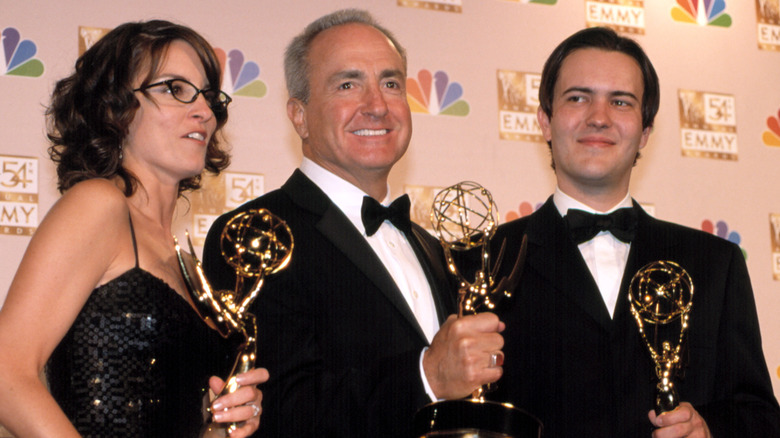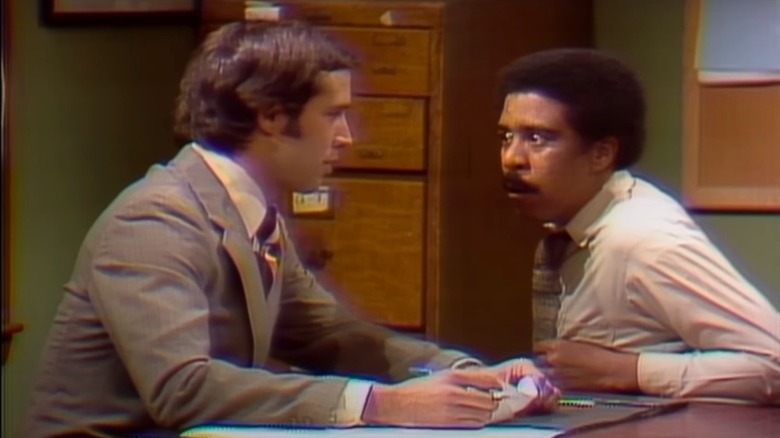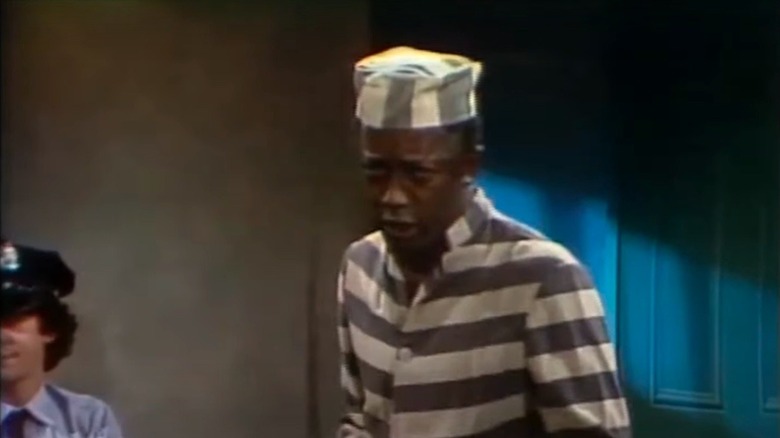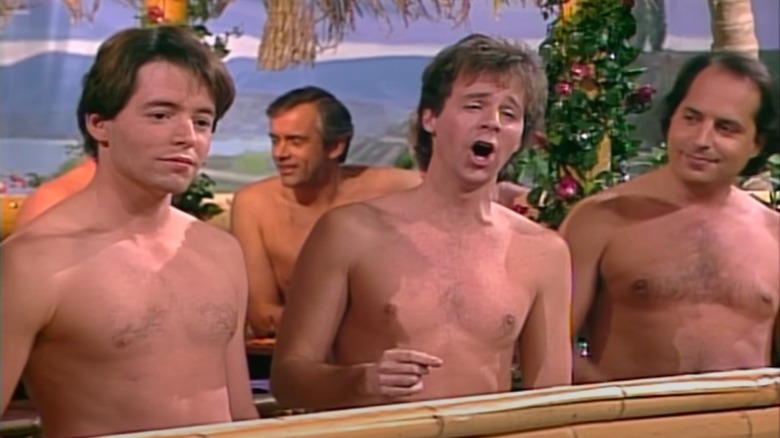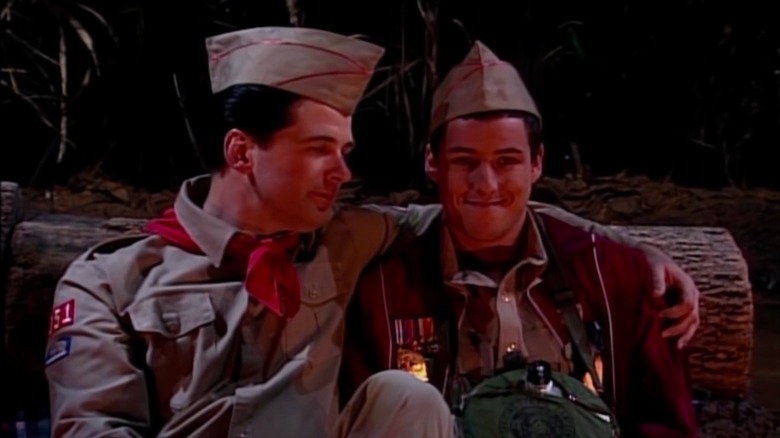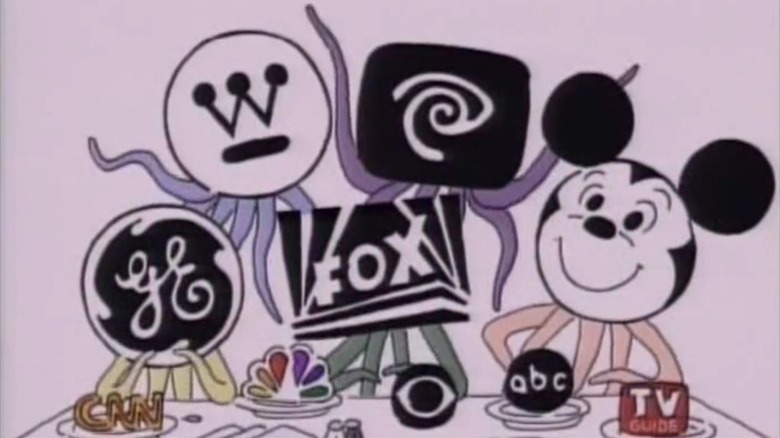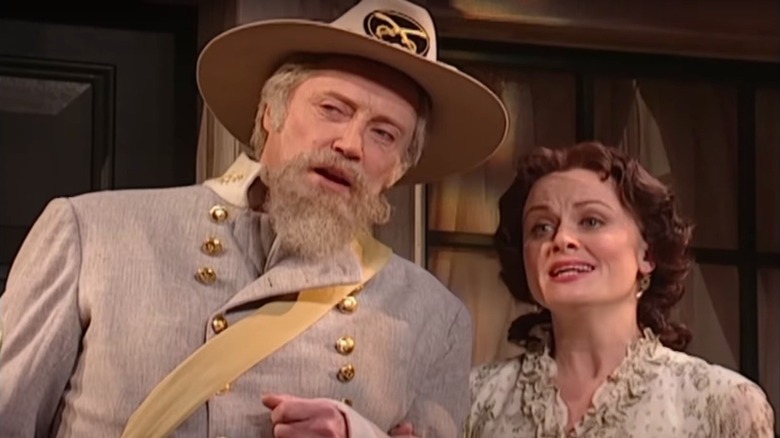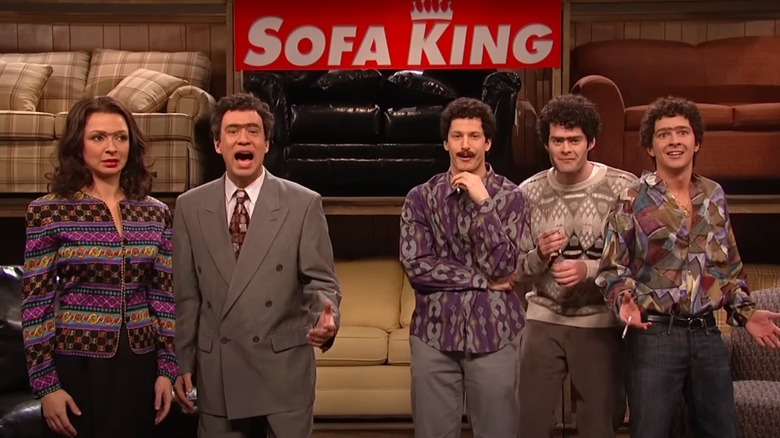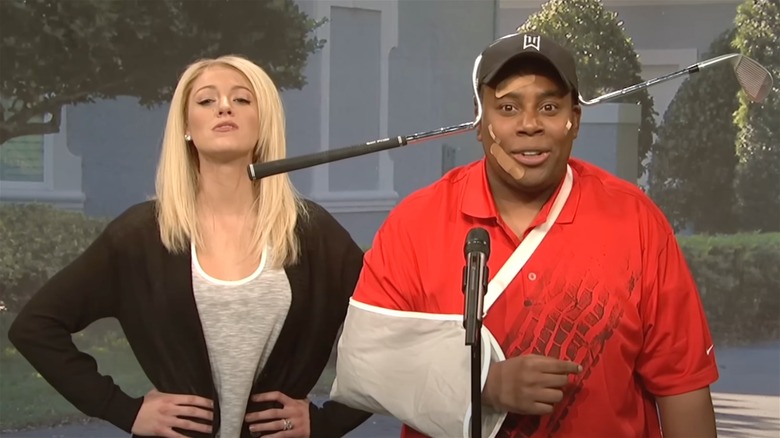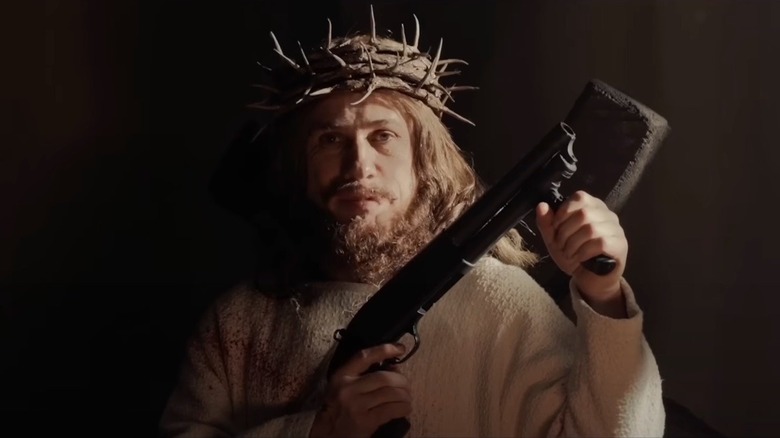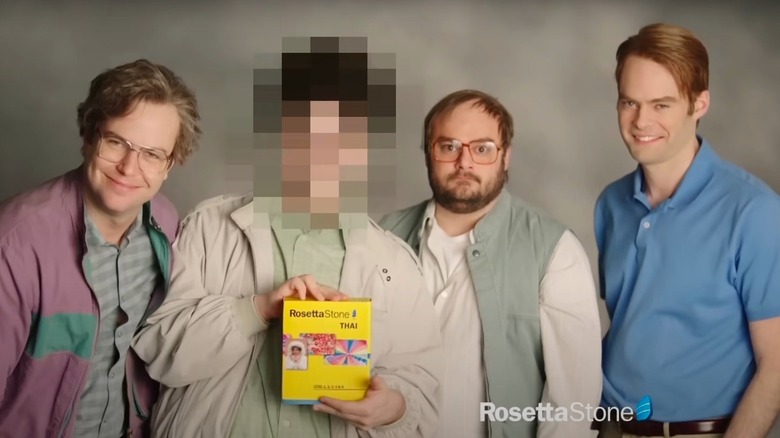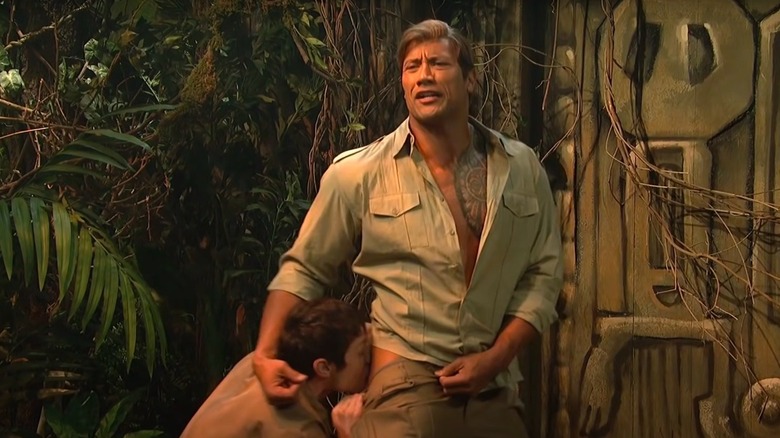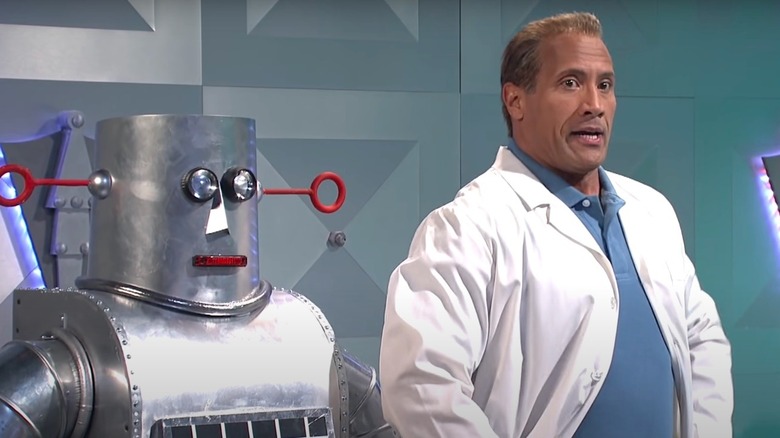Skits On Saturday Night Live That Really Pushed Boundaries
From the very first moments of "Saturday Night Live" in its 1975 NBC debut, viewers recognized it was unlike any other show that had come before. The unbelievably weird opening sketch, in fact, featured "SNL" writer Michael O'Donahue teaching a foreigner (played by John Belushi) to speak English phonetically, via such bizarro phrases as "I would like to feed your fingertips to the wolverines," and "'Hey,' Ned exclaimed, 'Let's boil the wolverines.'"
Right from the get-go, "SNL" developed a reputation for edgy, counterculture comedy that slowly wormed its way into the mainstream, eventually becoming a television institution in its own right. And even as the show became ingrained within the culture it continued to mock, every once in a while, the danger and unpredictability that served as the "SNL" hallmark in its early years continued to rear its head with sketches so outrageous viewers couldn't believe they made it onto network television.
For a closer look at some of the more notorious skits on "Saturday Night Live" that really pushed boundaries, read on.
Word Association (1975)
Comedian Richard Pryor hosted "Saturday Night Live" during its 1st season and appeared in a sketch that still ranks as one of the show's most controversial ever. In the sketch, Pryor plays a guy interviewing for a job, with cast member Chevy Chase — who's on-set behavior has brought shady claims about him – leading him in a word-association test, he is instructed to respond with the first word that pops into his head while Chase reads from a list. It all starts innocently enough, with words such as "dog" and '"rain," until Chase's language becomes racially charged. As Chase begins spitting out increasingly insulting racial slurs, the anger of Pryor's character is evident in the racial epithets he hurls back. It all comes to a head when Chase says the n-word, leading Pryor's character to respond, "Dead honky."
That edgy sketch brought attention to the fledgling late-night show and came to represent the show's groundbreaking take-no-prisoners style of guerilla comedy. "It defined us," "SNL" creator Lorne Michaels told The New York Times. "It put us on the map."
The sketch was written by late comedian Paul Mooney, brought in for the episode at the request of Pryor. In Mooney's memoir, "Black Is the New White," he claimed the skit was inspired by the grilling that he underwent from Michaels and various network executives. "Easiest sketch I ever write," Mooney recalled. "All I do is bring out what is going on beneath the surface of that interview with Lorne and the NBC execs."
Death Row Follies (1976)
Another racially charged sketch appeared just a few episodes later in that 1st season when the British comedy duo Peter Cook and Dudley Moore hosted. In the sketch, titled "Death Row Follies," Cook plays a director auditioning death-row inmates for a prison talent show. Garrett Morris, the show's sole Black cast member at the time, plays a prisoner who sings a self-penned song. The lyrics are simple but memorable: "I'm gonna get me a shotgun and kill all the whiteys I see," he sings.
Looking back, Morris recalled that the skit hadn't really been fleshed out, with Lorne Michaels telling him and the other performers to come up with something for their respective inmates' auditions. "So I had nothing," Morris said in an interview with Pop Goes the Culture. Then, he recalled remembering a story he'd heard from one of Harry Belafonte's singers about a Southern woman known for writing racist songs who was hauled onstage during Art Linkletter's TV show and invited to perform one of them. She reluctantly agreed and launched into what was, in essence, a white-supremacist version of the song that Morris performed in the sketch, but with the substitute of a racial slur for "whiteys."
"So basically, my Death Row Folly thing, that's how that got born," Morris recalled. "Then I added, 'When I shoot all the whiteys I see, then whitey he won't bother me' ... It is one of my most enduring [moments]."
Uncle Roy (1978-1980)
Child molestation isn't typically seen as the basis for comedy, but it formed the underlying premise of two sketches featuring frequent "SNL" host Buck Henry. Buck plays Uncle Roy, who babysits two preadolescent girls, played by Gilda Radner and Laraine Newman. Uncle Roy engages the girls in some highly questionable "games," such as asking them to search for "buried treasure" in his pants pockets, and far worse.
Henry was well aware of the perils of playing pedophilia for laughs, but rationalized doing it because the sketches were written by two female writers, Anne Beatts and Rosie Shuster. He also appreciated that, at the end of the second sketch, the girls' parents return and gush about how there's no one like good ol' Uncle Roy. Henry recalled looking directly into the camera and responding, "Oh, I don't think that's true — I think there's an Uncle Roy in every family," Henry told the Television Academy Foundation. "I thought that was a great moment in which, possibly, I can start interesting conversations in families across America about who was the Uncle Roy in their family," he explained.
"It was the lighter side of child molestation, I guess," Beatts told Vice. "Then the other thing was that the girls were innocent, and they just always triumphed over him, they turned the tables on him as a sexual predator, in a way. It pushed the envelope a little."
Nude Beach (1988)
"Saturday Night Live" host Matthew Broderick gamely appeared in a sketch that's gone down in history as one of the show's edgiest, in which he plays a guy vacationing at a nude beach resort. The comic hook in the skit was that his fellow nudists continually remarked about his genitalia, using the word "penis" a ridiculous number of times (more than 40, actually). "Fantastic piece," declared "SNL" creator Lorne Michaels during a 2022 appearance on the "Fly on the Wall with Dana Carvey and David Spade" podcast.
The sketch was written by Conan O'Brien and Robert Smigel. As O'Brien recalled on his "Conan O'Brien Needs a Friend" podcast, he was responsible for the penis-themed song at the end of the sketch and revealed that the sketch barely made it on the air when the network's standards and practices team objected. "They just said, 'There's just no way you can do this,' and we were arguing it," he remembered. "Like, it's part of the anatomy. You should be able to say penis. Of course now it's the most tame thing in the world."
"Nude Beach" generated a lot of controversy, along with a reported 46,000 viewer complaints. As a result, several big advertisers bailed on the show. "We lost Toyota. We lost two, three big sponsors," Michaels revealed. "Because people would boycott a [car] dealership ... whoever has the dealership in Mississippi is calling central headquarters going, 'There's people outside here protesting. Why are you sponsoring that show?'"
Canteen Boy (1994)
The spirit of Uncle Roy was alive and well in a 1994 sketch featuring "Saturday Night Live" host Alec Baldwin and Adam Sandler as Canteen Boy, a naive assistant scoutmaster. Canteen Boy had made several prior appearances on the show, but this sketch has remained the most memorable for its deeply uncomfortable undertones. In the sketch, Baldwin plays an older scoutmaster who makes sexual advances toward the clueless Canteen Boy, becoming increasingly less subtle. "Whoops, my shirt fell off," Baldwin's character blurts out after ripping off his shirt to expose his bare chest.
Many viewers were appalled. At the time, reported The Washington Post, Chicago Sun-Times columnist Richard Roeper wrote that he received calls from several viewers who stopped watching partway through the sketch. Baldwin returned to host later that year and addressed the controversy in his monologue. "Now, even though the character of Canteen Boy is a grown man, a perfectly intelligent 27-year-old, not a child, some people got the wrong idea and, frankly, all hell broke loose," he said, then offering the wildly exaggerated claim that NBC had received 300,000 complaints and lost seven affiliates because of the sketch.
According to the Post, whenever that sketch is rerun, a title card is shown informing viewers that "Canteen Boy is a highly intelligent though quite eccentric 27-year-old who still lives with his mother, and who, despite his age, remains active in scouting."
Conspiracy Theory Rock (1998)
A 1998 animated sketch, written by Robert Smigel, has earned a special place of notoriety in "Saturday Night Live" history by airing just once and never being broadcast again. A spoof of "Schoolhouse Rock," Smigel's "Conspiracy Theory Rock" explains how federal deregulation has allowed large media entities to gobble up smaller ones, with these acquisitions and mergers leading to just a handful of companies controlling all media in the U.S. Meanwhile, the sketch also notes that GE (which, at the time, owned NBC) and Westinghouse (which then owned CBS) are also manufacturers of high-tech weaponry, whose factories pump carcinogenic PCBs into the atmosphere.
Claims that the sketch had been forever banned from ever again airing on NBC have floated around for years, but don't appear to be entirely accurate. In a 2006 The New York Times profile of Smigel, "SNL" head honcho Lorne Michaels insisted that the skit had been removed from reruns (which are one hour, shortened from the live show's 90 minutes) so that the episode could include a second song from musical guest Backstreet Boys.
In that same profile, however, Smigel implied that NBC brass initially had no objections, but then changed their minds about subsequent reruns. "It just struck me as really funny to do it on our own network," he said. "I was somewhat delighted that they were okay to do that, and then they reconsidered. It's hard to get angry about it."
Schweddy Balls (1998)
Now a holiday classic that reruns each year in the annual "Saturday Night Live" Christmas specials, the 1998 "Schweddy Balls" sketch remains a brilliant example of juvenile wordplay that is laugh-out-loud funny by appealing to our inner Beavises and Butt-heads. The skit features host Alec Baldwin as Pete Schweddy, who visits NPR's "Delicious Dish" to share the recipe for his homemade holiday treat, Schweddy balls. "No one can resist my Schweddy balls," Baldwin deadpans at one point in the sketch.
Although the sketch has been broadcast plenty of times in primetime during holiday specials, NBC censors initially wanted to relegate the skit to the later minutes of the show, while Lorne Michaels fought to have it appear right up front. "Lorne very graciously fought for 'Schweddy Balls,'" Ana Gasteyer, who appears in the sketch, told Entertainment Weekly. "Standards and practices did not want to put it right at the top of the show. [Traditionally], racier content will play after midnight. I don't know if that's still the case. But [Michaels] so correctly understood that the characters were naive to the usage of the word 'balls' that he fought really hard and successfully to have it air before midnight, which I really appreciated."
More than two decades after it first aired, the sketch dredged up fresh controversy when Ben & Jerry's announced plans for a new Schweddy Balls flavor — and received backlash from a conservative group, One Million Moms, calling for a boycott.
Colonel Angus Comes Home (2003)
Several years after the TV debut of "Schweddy Balls," "Saturday Night Live" plumbed similar ground for another hilarious sketch based on naughty wordplay, 2003's "Colonel Angus Comes Home." The sketch, written by Tina Fey, begins with cast members Amy Poehler and Rachel Dratch sitting on a porch, costumed in late-1800s attire, while a banner above them reads, "Welcome Home Colonel Angus."
The titular officer eventually arrives, played by host Christopher Walken — who said his most famous "SNL" sketch ruined his life – with numerous lines riffing on how Colonel Angus, when spoken with a Southern accent, sounds like something else entirely. As they discuss the pros and cons of Colonel Angus, each mention of his name becomes more ribald and suggestive than the last. "I myself never much cared for Colonel Angus," Dratch's character drawls in the sketch's definitive line. "He rubs me the wrong way. Not sure why. Can't put my finger on it."
The coup de grace, of course, came when the colonel revealed he'd been stripped of his rank, and will no longer be known as Colonel Angus. From now on, he insists on being called by his given name: Anal Angus.
Corksoakers (2004)
In the tradition of the "Colonel Angus" sketch, 2004's "Corksoakers" takes a pair of innocuous words and puts them together so they sound almost like a filthy expletive. Set in Italy, winemakers Marcello (Jimmy Fallon) and Giuseppe (Horatio Sanz) take a group of American vacationers on a tour of their vineyard, making a stop in the corking room. One of the tourists, played by guest host Janet Jackson, expresses her interest in how the corks are placed in the wine bottles, leading their hosts — with Fallon and Sanz utilizing ridiculously over-the-top Italian accents — explaining the process of soaking the corks. "These three guys right here are some of the most talented corksoakers," Fallon's character responds, and urging the three, "Say hello, you old corksoakers."
As the sketch progresses, the joke is stretched to its limits. "I love-ah soaking cork," says one of the guys, played by Fred Armisen (also sporting a heavy accent). "I could-ah soak all-ah night long if they let me." The whole thing escalates to Marcello and Giuseppe reminiscing about the long-ago time when they simultaneously soaked each other's corks. Unable to remember the precise year, they determine it was at some point between '68 and '70.
While Sanz and Fallon were both notorious for cracking up in sketches, they made a concerted effort to keep it together for that one. "I really loved the sketch and I was like, 'Jimmy, let's not laugh. Because it will be dismissed. Let's just keep it real and try not to laugh.' And we did," Sanz told Vulture. "And I'm very proud of that scene because of it."
D**k in a Box (2006)
While it was somewhat improbable that "Schweddy Balls" would go on to become a classic "Saturday Night Live" holiday sketch, who would have imagined that the same fate would be in store for a musical skit in which Andy Samberg and host Justin Timberlake wrapped up their genitals as Christmas gifts to present to women? Yet that's precisely what happened with "D**k in a Box," which first appeared in the 2006 Christmas episode.
According to Timberlake, the filmed sketch had already been shot when they were told that the Federal Communications Commission wouldn't allow them to use that particular word on network television. After some negotiations, "D**k in a Box" was cleared for air — but with that word bleeped, a total of 16 times. "The irony of that," Timberlake said in an interview with Hot Ones, "is that I think the funnier version is the bleeped-out version."
While "D**k in a Box" has since joined the pantheon of beloved "SNL" sketches, it has certainly dredged up its fair share of controversy. According to a 2015 feature in The Atlantic, which analyzed FCC complaints about "SNL" over the previous three years, the sketch was still generating viewer complaints, all those years later.
Sofa King (2007)
"Saturday Night Live" viewers who cracked up at "Schweddy Balls" and "Colonel Angus" had a field day with the utterly silly 2007 sketch titled "Sofa King." The sketch was a faux TV commercial for a family-owned sofa retailer who'd experienced so much success with their mattress store — Mattress King — that they were expanding into sofas. The gag comes in how the store's moniker, Sofa King, is used in a new slogan adapted from their other store, in which the products sold are guaranteed to be "Mattress King great."
"How great is that?" asks the proprietor, played by Fred Armisen, who's answered by his wife, played by Maya Rudolph, who declares, "That's Sofa King great." They then ask their three sons about their products, with one describing a couch as "Sofa King comfortable," while another refers to the low price as "Sofa King cheap."
Interestingly, years before the "SNL" sketch aired, there was already a retailer in the U.K. called Sofa King — which had been the source of complaints since 2004. In 2012, The Guardian reported that Britain's Advertising Standards Authority had received numerous complaints about one of the company's newspaper advertisements, which read, "Where the Prices are Sofa King Low!" The organization determined that the phrase could be seen as offensive and ordered the company to stop using it in ads. Meanwhile, the actual Sofa King has suggested that the writers of the sketch were inspired by its company website.
The Situation Room: Tiger Woods' Accidents (2009)
Tiger Woods' cheating scandal was fodder for a "Saturday Night Live" sketch in 2009, framed as news report from CNN's "The Situation Room." With future "Ted Lasso" star Jason Sudeikis playing anchor Wolf Blitzer, the focus was on the recent admission of golf phenom Tiger Woods (played in the sketch by "SNL" veteran Kenan Thompson) that he'd been unfaithful to his then-wife, Elin Nordegren (guest host Blake Lively).
Thompson-as-Woods offers a scripted mea culp for his actions, declaring, "I offer my profound apology for these multiple transgressions." His wife's eyes blaze as she turns to him and replies, "Multiple? So it happened more than once?" Looking terrified, he backtracks. "Did I say multiple?" Suddenly, the camera feed cuts, throwing back to the studio, where Blitzer reports that Woods has just suffered an accident in his home, falling down the stairs and then accidentally throwing himself through a plate glass window. The couples is shown on camera again, this time with Woods' face adorned with Band-Aids and his arm in a cast, while his wife threateningly brandishes a golf club. This process continues, with Woods suffering further injuries as the sketch continues, the golf club eventually wrapped around his head and tire tracks on his shirt.
While the sketch got laughs inside Studio 8H, not everyone found the trope of an unfaithful husband being pummeled by his infuriated wife to be all that amusing. "There's nothing funny about this story, particularly if violence was part of the events that took place," Rita Smith, president of the National Coalition for Domestic Violence, declared in a statement to The Boston Herald. "It diminishes people's support for victims of domestic violence."
Djesus Uncrossed (2013)
Poking fun at religion, particularly Christianity, is still considered to be a big taboo in American television. "Saturday Night Live," however, pushed that envelope with its 2013 sketch "Djesus Uncrossed." A parody movie preview spoofing controversial director Quentin Tarantino's violent western, "Django Unchained," the sketch featured host Christoph Waltz as Jesus, complete with a crown of thorns and an array of weaponry ranging from swords to machine guns.
There's no turning the other cheek here; the resurrected Jesus rolls away the stone and immediately seeks revenge on the Roman centurions who crucified Him. "He may be wearing sandals, but he can still kick ass," a voiceover intones as Waltz, brandishing a Japanese katana, slices and dices his way through Romans.
The sketch received criticism from several religious groups, including the Catholic League, and even the Council on American-Islamic Relations (CAIR), a civil liberties and advocacy organization group representing Muslims. In a press release, CAIR decried the skit. "Such misrepresentation of what Jesus, peace be upon him, stands for is extremely offensive to Muslims and to all those who believe in his message," said CAIR national executive director Nihad Awad in a statement. "While we understand the use of shocking imagery and bizarre juxtapositions to provoke a humorous response, we believe such a distasteful portrayal of a religious figure revered by billions of Muslims and Christians worldwide crosses the comedic line." Meanwhile, the right-wing American Family Association pressured retailers Sears and JCPenney to pull their ads from "SNL."
Rosetta Stone (2013)
How did a 2013 "Saturday Night Live" sketch about language-teaching software wind up resulting in complaints from officials of a foreign government? That sketch, dubbed "Rosetta Stone," was a fake TV commercial for Rosetta Stone to introduce its latest edition, Thai. The skit's premise took the position that the only Americans who would want to learn Thai were creepy dudes traveling there for illicit purposes. That was made clear by the phrases taught in the course, which included "How much?" and "Is that for the whole night?" along with, "Oh my God, what have I done?"
As one might expect, the government of Thailand was not thrilled that the country was depicted as being less known for its beautiful beaches than for its reputation as a destination for depraved sex tourists. As Page Six reported (via E! News), Thailand's Culture Minister Sonthaya Khunploem, in conjunction with the country's Ministry of Foreign Affairs, was demanding that the clip of the sketch be removed from YouTube, so it wouldn't be seen by the citizens of Thailand, who were certain to be offended by the "SNL" characterization of their country.
"The government will also inform the U.S. Embassy that the commercial spoof is tarnishing Thailand's image, and will ask the embassy to explain the situation to the producer of 'Saturday Night Live,'" he said. That effort, however, was apparently unsuccessful, given that the sketch remains available to view on YouTube.
The Jungle (2015)
A 2015 "Saturday Night Live" movie spoof set the bar for combining silliness with suggestiveness by spoofing "Indiana Jones and the Temple of Doom." In the sketch, a scene from a faux 1983 movie "Escape from Jungle Island" features host Dwayne "The Rock" Johnson as Dr. Bones, with Pete Davidson as his sidekick, Short Long, and Kate McKinnon as translator Ms. Reese, who clearly has the hots for Bones.
Suddenly, the trio is besieged by headhunters, who fire poison darts at them, with one hitting Short Long in the neck. Luckily, Bones has the solution: suck out the poison and then spit it out. When he's then hit with a dart in the chest, Short Long returns the favor by sucking the poison from his nipple — while Reese's lusty efforts to volunteer her services are continually rebuffed.
As more darts come flying, another hits Johnson's character in the butt, with Davidson once again doing the honors. When they're both hit with darts in the crotch area, they come up with the genius idea. "Quick!" Dr. Bones tells his protégé. "Cartwheel up to me." He does, with the two sucking the venom out of each other while engaged in a particularly acrobatic emulation of a very specific sexual position (hint: it's typically identified by a number).
Heroin AM (2016)
Edgy doesn't even begin to describe "Heroin AM," a 2016 commercial parody in which "Seinfeld" alum Julia Louis-Dreyfus plays a suburban mom. In the faux spot, she extols the virtues of Heroin AM, a new pharmaceutical that allows users to enjoy all the effects of heroin without all that annoying nodding off (achieved with the addition of five milligrams of caffeine and a "small pile" of cocaine). As her character points out, Heroin AM is "the only non-drowsy heroin on the market, so I can get jacked on skag — and then get to work." The big punchline at the end of the parody reveals that she's a school bus driver, behind the wheel of a bus full of kids while high as a satellite (albeit in a very peppy way).
The sketch was hit with outrage, with numerous people taking to social media to underline the irony of mocking a deadly drug that took the lives of such "SNL" greats as John Belushi and Chris Farley. In addition, others criticized the flippancy of joking about an addiction epidemic that had cost so many their loved ones. "Making fun of the #heroin epidemic is bad satire #snl," tweeted an indignant viewer.
There were, of course, those who insisted its critics had missed the point of the sketch: that Big Pharma was peddling addictive opiates for profit. "A doctor prescribes a person an opiate painkiller, the person becomes addicted," wrote Paul Sacca on BroBible. "You are completely allowed to tackle a sensitive and heartbreaking subject through comedy."
World's Most Evil Invention (2017)
While Dwayne Johnson's "Indiana Jones" spoof may have pushed the envelope, a subsequent sketch featuring the wrestler-turned-actor went even further. In "World's Most Evil Invention," a meeting of the Mad Scientists Society is underway, presenting its annual award to the scientist who managed to create the most evil invention on the planet. After two scientists show off their creations — a shrink ray and a freeze ray, respectively — Johnson's scientist wheels out a crude-looking robot.
"Hi guys, my name is Roy," he states. "And for the most evil invention in the world contest, I invented a child-molesting robot." The big selling point, he explains, is that the robot can easily molest twice as many children as a human. His invention, it turns out, is a little too evil and totally creeps out the rest of the inventors — especially when Roy reveals his process. "What you do is you start by building a regular robot," he explains, "then you molest it and hope that it continues the cycle." Most bizarrely, the sketch ends by becoming an ad for the White Castle hamburger chain.
Not surprisingly, some viewers took offense. "Who seriously thought this child molester robot sketch was IN ANY WAY FUNNY?!?!" tweeted one, while another tweeted, "Harming children isn't funny. 'SNL' crossed the line here." Of course, the sketch also had its fans. "'SNL' rarely goes this dark, but this one works," read a review from the A.V. Club.
Safelite (2017)
"Saturday Night Live" has delivered countless parodies of TV commercials over the years, including fake commercials for actual companies. Such was the case with the 2017 sketch spoofing Safelite, which repairs broken vehicle windshields. In the faux ad spot, "SNL" cast member Beck Bennett plays Ken, a Safelite technician who saves the day by installing a new windshield to replace a cracked one so that a mom (Aidy Bryant) and her teenage daughter (Melissa Villaseñor) can make it in time for her high school basketball game. As the sketch unfolds, however, it becomes clear that Ken is a creepy stalker obsessed with the teen, who's been smashing their windshield so he can replace it as an excuse to interact with her.
Not surprisingly, the folks at the real-life Safelite weren't exactly thrilled by the show's depiction of its employees, and fired back via social media. "@nbcsnl thanks for the skit. Although we can take a joke, this one was a step too far. Our techs are our heroes," read the tweet, which added a hashtag, "#notcool." Safelite continued by responding to questions about the parody, including another tweet attempting to distance the company from the sketch: "We weren't involved in creating it and we're really disappointed in @NBCSNL for airing it."
In response to the backlash, "Saturday Night Live" removed the sketch from the internet, and promised it would never air on television again. "When the 'SNL' sketch featuring Safelite first aired, we expressed our disappointment with how it negatively portrayed our people," a Safelite spokesperson told Decider. "It was 'SNL”s decision to remove the content, and they have not shared their reasons behind that decision."
Gen Z Hospital (2021)
Among the most controversial guests to ever grace the stage of Studio 8H, Tesla/SpaceX tycoon Elon Musk notoriously hosted "Saturday Night Live" in 2021. While many viewers were outraged, among the celebs who can't stand Musk is "SNL" cast member Chloe Fineman, who claimed in a TikTok that he brought her to tears when she brought him a sketch she'd written, and he "stared at me like [he was] firing me from Tesla and [was] like, 'It's not funny.'"
Musk generated even more controversy when he appeared in a sketch set in a hospital with a premise mocking Gen-Z tropes. With Musk playing an older doctor, various members of the cast portrayed Gen Zers, utilizing such slang terms as "bestie," "sus," "the tea," and more.
Backlash to the sketch, however, came from those who pointed out the terms being used were actually rooted in Black slang, known by the academic term African-American Vernacular English (AAVE). "The appropriation of AAVE by white people is gross," stated a tweet, which also complained that the writers seemingly pulled random words from the Urban Dictionary website. Another tweet shared similar criticism. "This Gen Z hospital skit on 'SNL' is so stupid," read the post. "I'm so tired of nonblack people throwing random AAVE terms in their sentences and calling that horse s*** 'Gen Z language.'"
Try Guys (2022)
The Try Guys burned up the internet with their YouTube videos testing out all manner of activities, racking up millions of views and massive success along the way. Back in 2022, however, one member of the group, Ned Fulmer, generated headlines when he was caught cheating on his wife by internet sleuths. After it was revealed that the woman he'd been cheating with was a Try Guys staffer, Fulmer confessed to his adultery and subsequently left the Try Guys.
The situation was spoofed in a "Saturday Night Live" sketch, in which a CNN news report from the White House is interrupted by breaking news that the other three Try Guys are responding to Fulmer's cheating scandal. Like many viewers, the CNN anchor (played by Ego Nwodim) has no idea who the Try Guys are, or what the big deal is. "I am trying to understand why this story is such a scandal," she asks. "Was this affair non-consensual?" One of the three responds by telling her, "No, worse. He committed the heinous act of having a consensual kiss and not telling us, his friends."
The sketch was eviscerated, however, for ignoring the inherent power dynamics of Fulmer engaging in a relationship with a subordinate. As one X user tweeted, the sketch missed that entirely, depicting Fulmer's indiscretion as just a cheating scandal. "This was a power imbalance, and companies like SNL are just twisting the narrative for laughs," the tweet declared.
The White POTUS (2025)
The third season of HBO's "The White Lotus" became a pop-culture sensation when it debuted in early 2025. Not surprisingly, "SNL" delivered its own parody, albeit with a political spin: "The White POTUS," in which various characters from the show are recast as the inner circle of President Donald Trump's administration, with Trump himself (played by James Austin Johnson) at the center of it all.
Controversy erupted after cast member Sarah Sherman portrayed Aimee Lou Wood's character from the show, outfitted with a set of comically large front teeth to mock the British actor's prominent overbite. Wood saw the sketch and shared her feelings about it in an Instagram Story post that has since been deleted. "Whilst in honest mode — I did find the 'SNL' thing mean and unfunny," she wrote (via The Guardian). When interviewed by "Extra," cast member Bowen Yang admitted that he agreed with Wood's assessment of the show's portrayal of her. "However she reacted to that sketch is completely valid," Yang said. "With parody, you kind of forget the sort of human, emotional cost that it sort of extols on someone."
All was forgiven, however, when Wood wrote on social media that she received apologies from someone at "SNL." She also shared a subsequent post to reveal that Sherman had reached out to apologize, sending her flowers.

